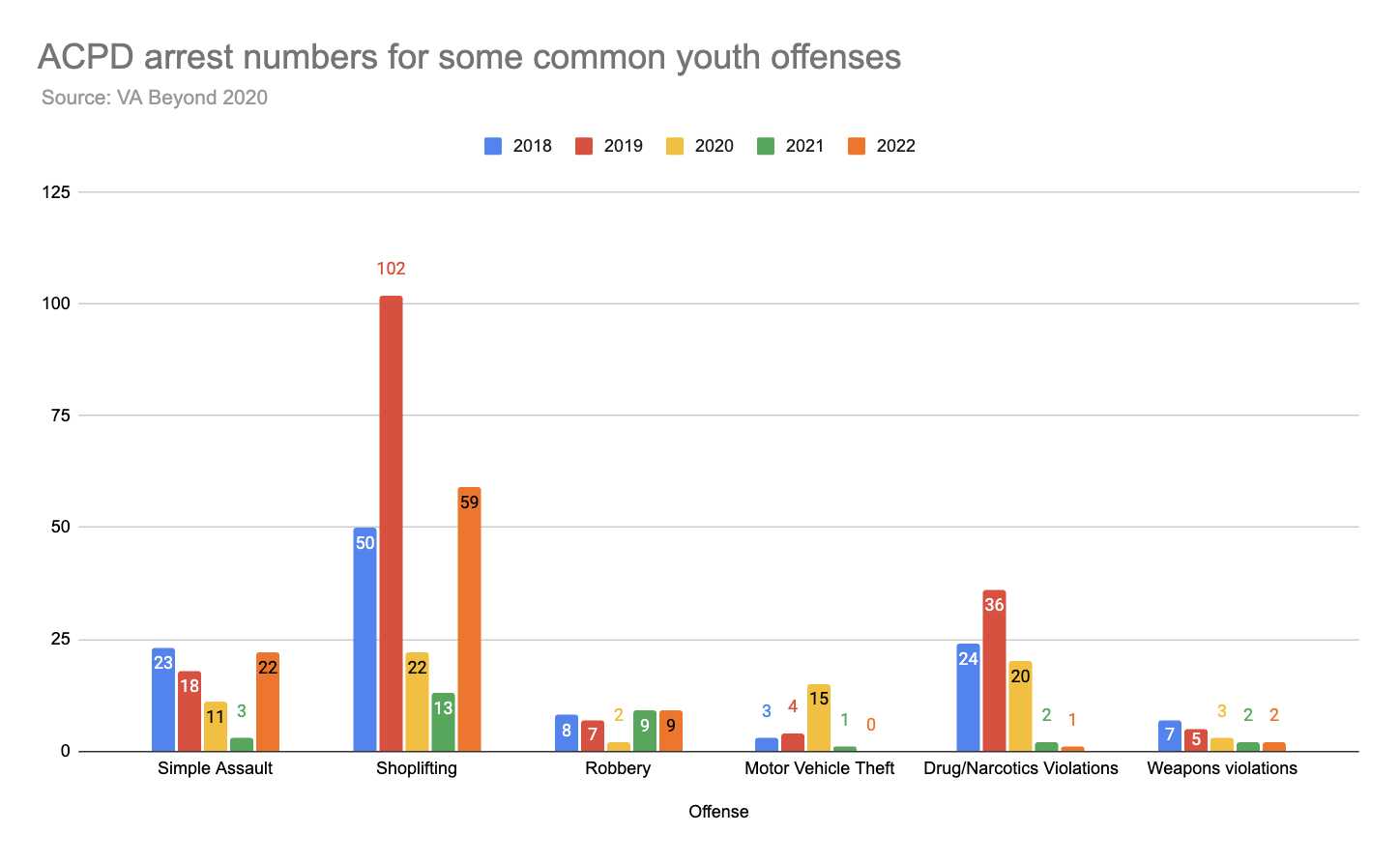
A new program diverting teens from the criminal justice system has seen 27 referrals for a variety of criminal offenses, largely related to theft, assault and drug and alcohol violations.
Shoplifting and physical disagreements with peers are exactly the kinds of crimes Devanshi Patel expects to see go through the program, run by the nonprofit she leads called the Center for Youth and Family Advocacy (CYFA).
The organization is one of two in Arlington County attempting to keep juveniles out of the criminal-legal system — the other being Restorative Arlington. Leaders of both say they offer an alternative to the traditional, adversarial court process that takes into account the needs of victims of crimes as well as the youth who commit them.
“When a kid has a relational issue, whether it’s with a peer or family member, there are better ways to help that kid understand what is going on or why they’ve engaged in that type of response or where their actions come from… so they don’t make that same decision again in the future,” says Patel, who is also a substitute judge in Arlington. “This type of program is different because we’re not using the legal system to provide those resources.”
Between August and October, CYFA reports ACPD responded to 71 incidents of youth-based harm, of which 24 involved offense types not eligible for referral to CYFA and another 21 that were not referred. In 13 eligible cases, the victim wished to seek legal redress through the courts.
CYFA received 13 referrals, of which 11 came from ACPD, before the juveniles were charged while two came from the Arlington Juvenile Court Services Unit, after they were charged. Since then, the total number of referrals has gone up to 27, as of this month.
Of the cases CYFA has opened, nine have been closed.
“We’re actually a little surprised at how well it’s gone,” said ACPD Deputy Chief Wayne Vincent, in a recent video CYFA produced.
“Some people may argue, ‘Well, just hold them accountable and send them off to the detention center or have the courts deal with it,'” he continued. “It’s very traumatizing. I think the studies are very clear that you know, the less that we can have a child go through the criminal justice system, at least in the early stages, I think the better for them.”

So far, CYFA has received $100,000 from Arlington County to support this work. For the last few years, the county has involved itself in the creation of programs that use restorative justice principles, such as voluntary conferencing between victims and offenders, to divert young people from the criminal-legal system, before or after they have been charged with a crime.
It stood up Restorative Arlington, now a separate nonprofit, and funneled support to community-based programs, including that of CYFA.
The county says its backseat role allows it to also fund a broader range of “innovative programs that further advance restorative justice.”
Restorative Arlington offers conferencing while CYFA offers both conferencing and a “Youth Peer Court” program, where participants sit down with “peer ambassadors” who take the positions of defense attorney, prosecutor and judge. There are at least one thousand different peer courts across the country but some practitioners say conferencing is truer to the roots of restorative justice than peer courts that borrow the structure of the judicial system.
Patel says peer courts are restorative because it exists wholly outside the system and participants have already admitted wrongdoing. The “prosecutor” explains the harm caused, the “defense attorney” explains why it might have happened and the “judge” provides a way forward. This can include letters of apology, community service or classes, which participants agree to complete under the supervision of a coordinator.
“The kid who’s coming to take responsibility is coming to take responsibility,” she said. “They’re not trying to mitigate the actions that are necessary to take responsibility.”
While the county has ceded diversion efforts to community programs, it is doubling down on ways to provide healthy outlets for teens while intervening in cases where they are struggling with substance use disorders, prompted by fatal and non-fatal opioid overdoses and other substance use calls.
County Manager Mark Schwartz told the County Board last week there is a county-wide effort with Arlington Public Schools staff to figure out how to improve its existing programs and create new opportunities, using a $750,000 appropriation the Board approved late last year.
To publicize existing programs, Schwartz says staff will translate more information, make website improvements and up the county’s direct outreach. The Dept. of Parks and Recreation has expanded weekend teen programming and will add more soccer programming and a Teen Club at Kenmore Middle School every Friday from 2:30-4:15 p.m., starting this Friday.
There will be games, team-building activities, arts and crafts projects and monthly trips to local community centers. A comparable club at Washington-Liberty High School is also starting up on Wednesdays from 3:15-5 p.m.
DPR will also host two new teen late-night sports programs at Arlington Mill Community Center. Drop-in basketball for high schoolers will begin next Friday and repeat every Friday from 9 p.m. to midnight, through June 15. A similar soccer program will be coming online later next month.
In terms of drug addiction intervention, the county has placed a counselor each at Washington-Liberty and Wakefield High School, and is onboarding another two, bound for Yorktown and the Arlington Career Center. It is standing up a pilot mentoring programs that could become permanent offerings, pending its success, as early as July 1.
“These are kids who, in many cases, are already addicted or on the brink of addiction,” said Schwartz, stressing that they need the government not just to step in but equip caregivers and community members with the tools to intervene, too.
“And I will tell you that’s an incredible challenge,” he continued. “There are not as many resources out there as we would like.”
Schwartz say he will have more details next month, including how local organizations with programs can partner with APS and the county and tap into the pot of money available.
Community organizations, meanwhile, are organizing to ensure this money is spent efficiently — and soon — to help young people, putting on a free assembly on Wednesday, Feb. 7 at 7 p.m. at Kenmore.
“Last year Arlington County officials committed $750,000 in a pilot effort to strengthen after school programming,” per a press release for the event. “As concerned community members, we are gathering to act on and bring these efforts to life.”
Organizers expect some 200 participants, including more than 100 teens. The event is bing organized by Virginians Organized for Interfaith Community Engagement, the Arlington Branch of the NAACP, Arlington Schools Hispanic Parents Association and the County Council of PTAs.

